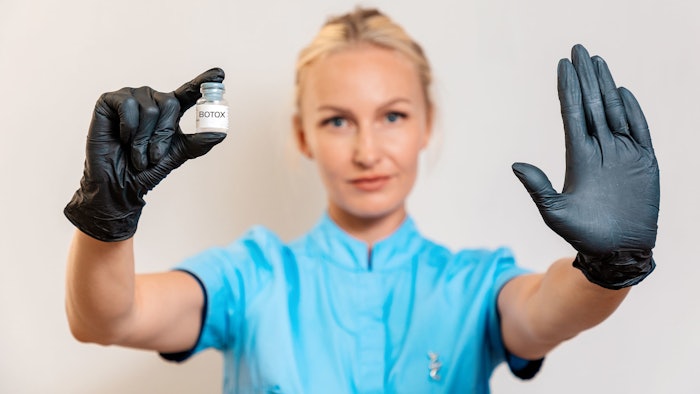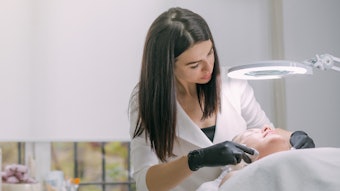
Reports from several U.S. states of harmful reactions to counterfeit or mishandled botulinum toxin injections has prompted the Centers for Disease Control and Prevention (CDC) and the Food and Drug Administration (FDA) to investigate the unverified sources of the product and issue warnings on injectables safety.
As of April 18, 2024, a total of 22 people from 11 states have reported harmful reactions after receiving botulinum toxin injections from unlicensed or untrained individuals or in non-healthcare settings, such as homes and spas, per the CDC. Harmful reactions occurred on dates ranging from November 4, 2023, to March 31, 2024. States reporting these reactions include California, Colorado, Florida, Illinois, Kentucky, Nebraska, New Jersey, New York, Tennessee, Texas and Washington.
Related: New Petition Calls for Stronger Safety Warnings on Botox Labels
Of the 20 people with information available, 11 (55%) people were hospitalized and 6 (27%) were treated with botulism antitoxin because of concerns that the botulinum toxin could have spread beyond the injection site. Of seven people tested for botulism, six people had negative results. Results are pending for one person, per the CDC.
All reports came from females, ranging in age from 25 to 59 years, with a median age of 41 years. They all reported receiving these injections from unlicensed or untrained individuals or in non-healthcare settings, including homes and spas.
"These treatments are among the most common cosmetic procedures performed worldwide which, unfortunately, leads to illegal and dangerous practices," said Alex Sobel, D.O., FAACS, president of the American Academy of Cosmetic Surgery. "Physicians, practices, Allergan/AbbVie, the FDA and the public must work together for the safe enjoyment of Botox and other neuromodulators.
Common Symptoms:
- Blurry vision and double vision
- Drooping eyelids
- Difficulty swallowing
- Dry mouth
- Slurred speech
- Difficulty breathing
- Fatigue
- Generalized weakness
Patient Safety Concerns
The FDA previously issued a guidance in 2023 that anyone considering a neurotoxin or dermal filler should consult with a licensed provider who is experienced in injecting dermal fillers, knowledgeable about fillers, anatomy and managing complications and knows the risks and benefits of treatment.
The American Society for Dermatologic Surgery Association (ASDSA) is calling on states to strengthen patient safety through increased oversight of medical care in all settings. The ASDA stated that these reported cases highlight the need for increased public protection measures, like the recommendations in ASDSA’s “Medical Spa Safety Act,” to ensure patients’ safety.
ASDSA president Seth Matarasso, M.D., said, “ASDSA takes the safety of patients very seriously, and we urge states to consider this in regulating medical practice in all settings of care. It is important to make sure all patients receive FDA approved products and not counterfeit or otherwise unsafe treatments. Lack of regulation and enforcement has enabled many to offer medical procedures for cosmetic purposes outside of their training and expertise.”
Amy Derick, M.D., president of the Illinois Dermatological Society, echoed the stance from the ASDSA.
“The Illinois Dermatological Society (IDS) stresses the critical need for cosmetic medical procedures to be performed by physicians with specialized training or those who follow established medical protocols under physician guidance," Derick said. "The recent botulism-like cases in Illinois are a stark reminder of the risks associated with unauthorized practitioners. We stand with ASDSA and align with state health authorities in advocating for patients to receive treatments exclusively from licensed professionals employing FDA-approved products. This approach is fundamental to maintaining the utmost standards of patient safety and quality of care.”
Medical Professional Recommendations
The CDC recommends that medical providers encourage patients to receive injections only from licensed providers who are trained in proper administration of FDA-approved botulinum toxin, preferably in a licensed or accredited healthcare setting. Some states have a license look-up tool where patients can check if a provider or setting has the appropriate license.
“Individuals seeking more than basic aesthetic treatments or skin care must opt for physician-based practices, even if it comes at a higher cost,” explains Cynthia Elliott, M.D., owner and primary practitioner of Skinspirations. “As the complexity of a procedure increases, and with it, the potential for complications, it becomes crucial for individuals to prioritize a physician for their treatment.”
As medical professionals have pointed out, injectable treatments can go beyond the scope of basic treatments and require intensive training and experience to safely perform. Patients need to take proper care when searching for a injector.
"Patients have the right to know where their Botox comes from and how it has been handled," Dr. Sobel said. "However, there will be unscrupulous and reckless providers and practices that will deceive patients; I urge patients to seek these treatments where they are confident in the education, training, experience and ethics of those involved in their care."










